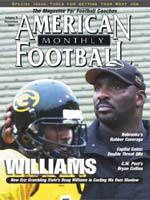AMERICAN FOOTBALL MONTHLY THE #1 RESOURCE FOR FOOTBALL COACHES
Article CategoriesAFM Magazine
|
One Step Back ... Two Steps ForwardBryan Collins of C.W. Postby: Richard Scott © More from this issue Bryan Collins never wanted to leave C.W. Post in the first place. He enjoyed his job as an assistant coach and felt like he could grow and succeed at Post. But with a wife and a child on the way, the idea of a part-time coaching job was enough to convince him it was time to leave Post for another opportunity. “I had been a part-time coach for three years,” Collins says. “I did enjoy my time here but with only two full-time coaches I just felt like there was never going to be an opportunity for me to be a full-time coach. I left here on good terms, I appreciated my time here and it was still a tough decision, but it was something I wanted to try. I wanted to be a full-time college coach.” Collins couldn’t have known it then, but the decision to step away from....The full article can only be seen by subscribers. Subscribe today!
|
|
|||||||
| HOME |
MAGAZINE |
SUBSCRIBE | ONLINE COLUMNISTS | COACHING VIDEOS |
Copyright 2025, AmericanFootballMonthly.com
All Rights Reserved





